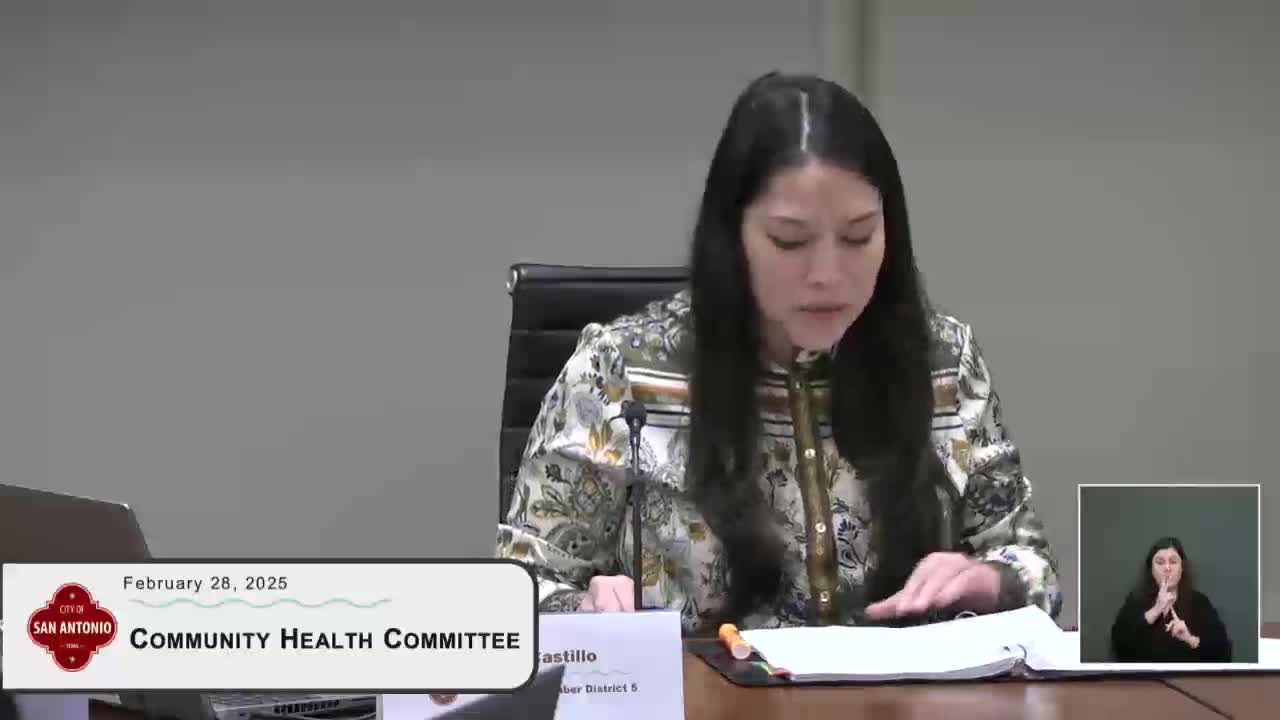Committee approves $100,000 supplement for San AntonioReproductive Justice Fund after extensive public comment
Get AI-powered insights, summaries, and transcripts
Subscribe
Summary
The Community Health Committee voted to advance a request to add $100,000 to the city—s Reproductive Justice Fund for downstream services such as transportation and navigation; the request follows months of public advocacy and concern about legal risk and procurement hurdles.
The Community Health Committee on Feb. 28 voted to advance a request to add $100,000 to San Antonio—s Reproductive Justice Fund to support downstream reproductive health services, after a lengthy public-comment period that included both supporters and opponents.
Supporters told the committee the funding would help residents who must travel out of state to access abortion care and other reproductive health services. Anna Trevino, a San Antonio resident and organizer with Texas Rising, said the city should not delay: "Repro justice and most importantly people's health cannot wait," she said. Kate Sondres, senior manager for organizing and advocacy at Planned Parenthood South Texas, told the committee that a modest city investment could reduce hardship: "Dollars 100,000 really is a drop in the bucket and it will actually save lives," she said.
The measure was framed by Metro Health staff as a limited, targeted supplement to an existing grant program. Metro Health said the earlier round of awards, approved by City Council in November, totaled $499,179 across four vendors (LATCH, PowerHouse, San Antonio AIDS Foundation and the YWCA) and that those contracts expire Nov. 30, 2025. Staff recommended the additional $100,000 be limited to downstream services not already addressed and proposed a solicitation targeted to the 10 original applicants, using the same scoring matrix and a 30-day solicitation followed by a 30-day review period.
Public commenters described practical needs and diverse rationales for the funding. Erica Galindo, program manager for Little Fund, said grassroots groups already pay for travel and support: "Last year, we broke our record of spending over $2,000,000 on funding abortion," she said, arguing that bans do not eliminate need but increase cost and risk. Jane—s Due Process—s youth advocacy manager, Adriana Rodriguez, said city support for reproductive services is an extension of other municipal investments that help families thrive.
Opponents also addressed the committee. One speaker, Paul Cuomo, said the city—s discussion of the fund was outside the city—s authority and said, "You continue to violate state law. You continue to engage in discussions of policy that are not city business," and referenced an existing lawsuit filed against the city.
Council members discussed procurement, legal exposure and budgeting. Councilwoman Cabello Hovdre (memo submitted Nov. 22) had requested the targeted supplement earlier; she told the committee the funds should remain within the Reproductive Justice Fund regardless of the level of proposals received so money remains available to nonprofits. Councilwoman Villagran moved to approve the request; a second was given, and the committee chair called the question. The chair then took the voice vote and stated, "Motion carries." The committee did not record a roll-call vote for the item during the meeting transcript.
Metro Health and finance staff warned of expected procurement obstacles for small nonprofits, including concerns about open-records requests, contracting timelines and the challenge of providing upfront cash flow (advance payments are typically not allowed). Staff also noted potential legal uncertainty from pending state legislation; Councilwoman Rocha asked about proposed state bill SB 730 and was advised the city attorney—s office would monitor legal developments and ensure compliance if the law changes.
The committee—s action forwards the $100,000 supplemental appropriation and the proposed limited solicitation to full City Council for final approval and appropriation. If Council approves, Metro Health indicated the department would use the same scoring matrix and limit applications to the 10 original respondents, with a short solicitation and review timeline intended to accelerate awards.
What happened next: The committee motion to approve the additional $100,000 passed by voice vote; the item is scheduled to be sent to full City Council for consideration and appropriation.
Sources: public comments and staff presentation at the Feb. 28 Community Health Committee meeting; Metro Health briefing materials presented to the committee.
